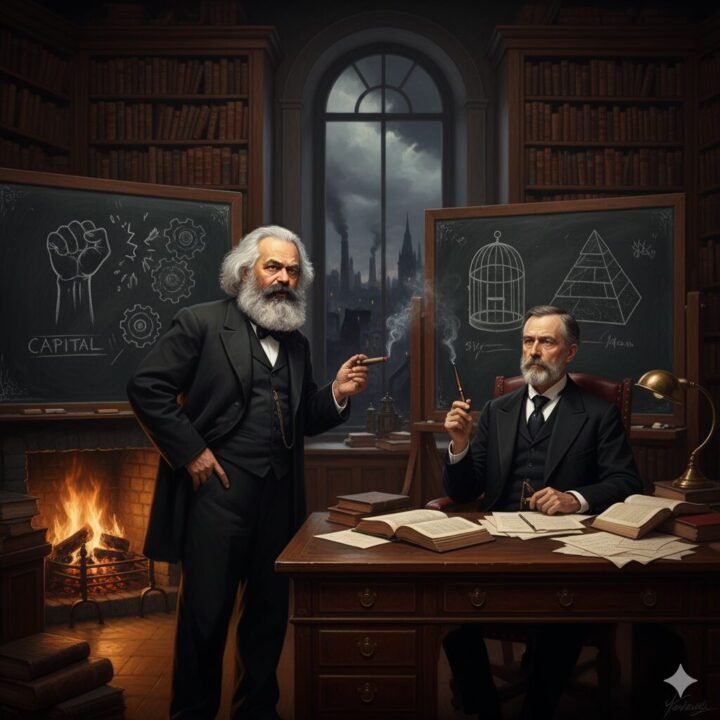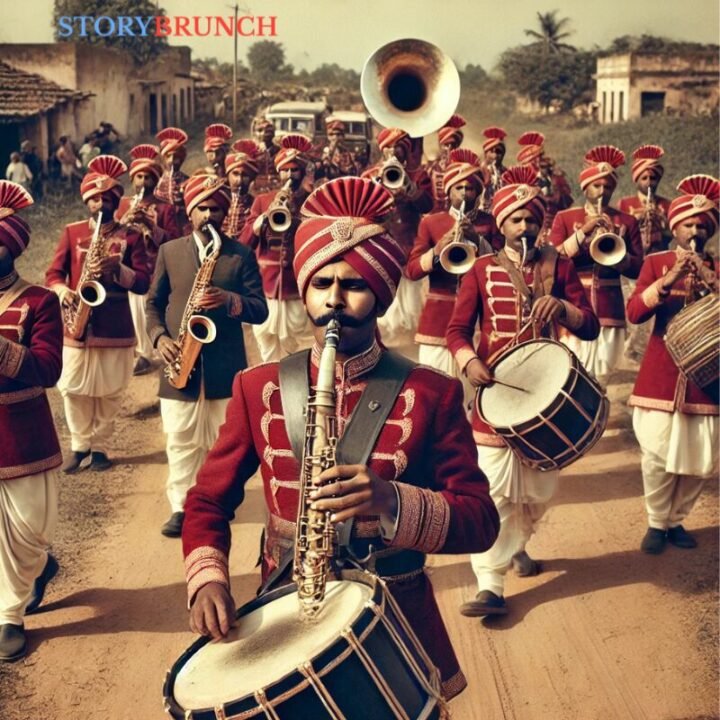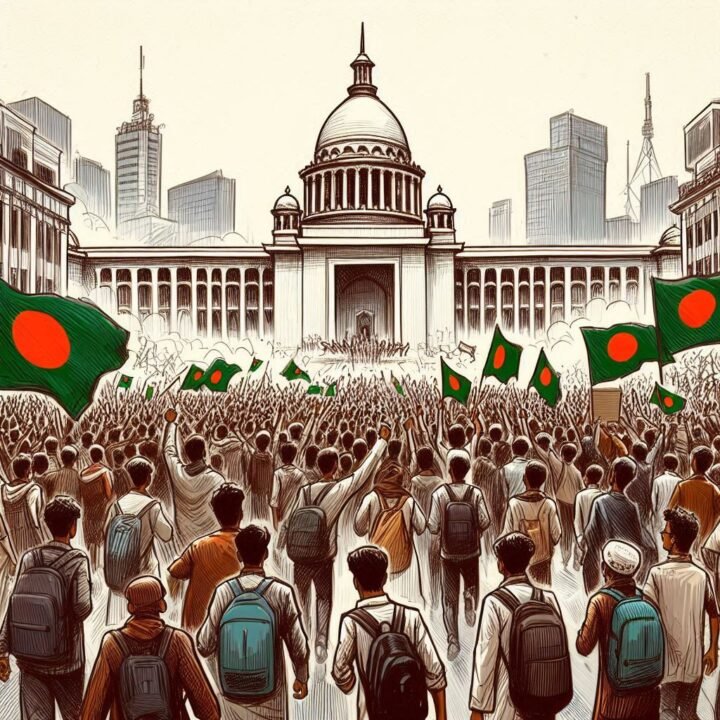Here is a hypothetical conversation between Karl Marx and Max Weber, two titans of sociology, as they debate their concepts of class, hierarchy, and the future of social struggle.
A Late-Night Debate: Marx and Weber on Class and Power
The year is an imagined “afterlife” of academic contemplation. The setting is a somewhat dusty, richly paneled study, thick with the scent of aged tobacco and old paper. Karl Marx, perpetually disheveled but with a fervent gleam in his eye, paces before a roaring fireplace. Max Weber, impeccably dressed in a dark suit, sits calmly at a large oak desk, carefully examining the stem of his pipe.
The Foundation of Class: Property vs. Opportunity
Marx: (Stopping abruptly, gesturing dramatically with his cigar) Max, my dear colleague, you dissect the world with such precision, yet you miss the fundamental, visceral truth! Your “class” is an ethereal concept. Mine is concrete, brutal! Class is the direct relationship to the means of production. You either own the factory, the land, the capital – the Bourgeoisie – or you are forced to sell your life-force, your labour-power, to survive – the Proletariat! All struggle flows from this material base.
Weber: (Taking a slow draw from his pipe) Karl, you mistake the foundation for the entire edifice. That material base, while undeniably powerful, is but one axis. Your theory, while elegantly dialectical, is reductive. For me, Class is an economic life-chance—a group of people who share similar positions in the market. The bank manager, the factory owner, and the retired capitalist have capital, yes, but their market power and life chances are distinct from, say, a highly skilled engineer who owns no factories but commands a vast salary. You ignore the sheer complexity of market situations and propertyless professionals!
Marx: (Scoffs) “Propertyless professionals!” A sophisticated term for sophisticated servants! They merely command a higher price for their labour-power. They are the petty bourgeoisie‘s intellectual vanguard, a buffer class that delays the inevitable reckoning, nothing more. The fundamental antagonism remains: Capital versus Labour!
Hierarchy and Status: The Veil of Honour
Weber: This brings us to the crucial difference, Karl: Hierarchy is not solely economic. You collapse everything into Class. I insist on a multidimensional view of power. My hierarchy is composed of three distinct realms, often overlapping, yet independent: Class (economic power), Party (political power), and Status (social honour).
Marx: Status! A charming word for a self-deception! You talk of “honour” and “prestige.” I see the ideological superstructure, the ‘veil of ideas’ the dominant class weaves to legitimize its theft! A wealthy aristocrat maintains “honour” not because his lineage is inherently noble, but because he controls the apparatus—the Church, the State, the University—that defines nobility. Prestige is merely petrified economic power.
Weber: On the contrary! Status can actively subvert economic class! Consider the impoverished but revered priest or the highly decorated war veteran who is financially poor. Their Status group provides them with a social standing, an exclusionary lifestyle, and a power of influence—perhaps over marriage or local politics—that is denied to the newly rich, but socially unpolished, industrialist. Your industrialist has Class power; the priest has Status power. They struggle not just over wages, but over recognition and deference. It’s the struggle of the caste system against the open market!
Marx: (A wry smile touches his lips) Ah, Max, you grant the illusion of honour too much material weight. A starving priest’s status is a poor substitute for a full belly and warm lodgings. You confuse the reflection with the source of light.
The End of the Struggle: Revolution vs. The Iron Cage
Weber: Now we reach the climax of our disagreement. You foresee a glorious, apocalyptic Revolution where the Proletariat casts off its chains, abolishes private property, and ushers in a classless, utopian Communism. A grand narrative indeed!
Marx: It is not a fantasy, but a historical necessity! The internal contradictions of capitalism—the falling rate of profit, the ever-widening gap, the creation of its own grave-diggers—make the dictatorship of the proletariat inevitable. The struggle ends with the transcendence of alienation and the true beginning of human history!
Weber: (Knocking the ash from his pipe, his expression turning melancholic) And I see a far colder, far less dramatic fate. The struggle will not end in a sudden, liberating Aufhebung (sublation). Instead, the forces of rationalization—the very bureaucracy and technical efficiency that capitalism breeds—will only intensify.
Marx: Rationalization is merely another tool of Capital!
Weber: No, Karl, it becomes an autonomous force! We are building not a paradise, but an Iron Cage of our own making . In this cage, life is meticulously administered, specialized, and rule-bound. The struggle will not conclude with a burst of freedom but with a weary, grey acceptance of the ‘specialist without spirit, sensualist without heart.’ The end result of the struggle is not communism, but an eternal, highly-rationalized bureaucracy where the market is merely regulated, not overthrown, and power resides in the anonymous, unfeeling files and procedures.
Marx: A cage built on procedure is still a cage built by men! And men, when truly deprived, will shatter the glass walls of your bureaucracy just as surely as they will seize the factory gates! The history of all hitherto existing society is the history of class struggles, Max. And that struggle will continue until the last chains are broken, whether they be made of iron, gold, or formalities.
Weber: (Shaking his head faintly) Perhaps. But I fear your liberated man will simply inherit the administrative tools of his former masters and find, to his profound dismay, that he cannot escape the necessity of governing—and thus, the necessity of creating a new hierarchy, perhaps even colder and more efficient than the last. Good night, Karl. The bureaucracy, sadly, always sleeps well.










